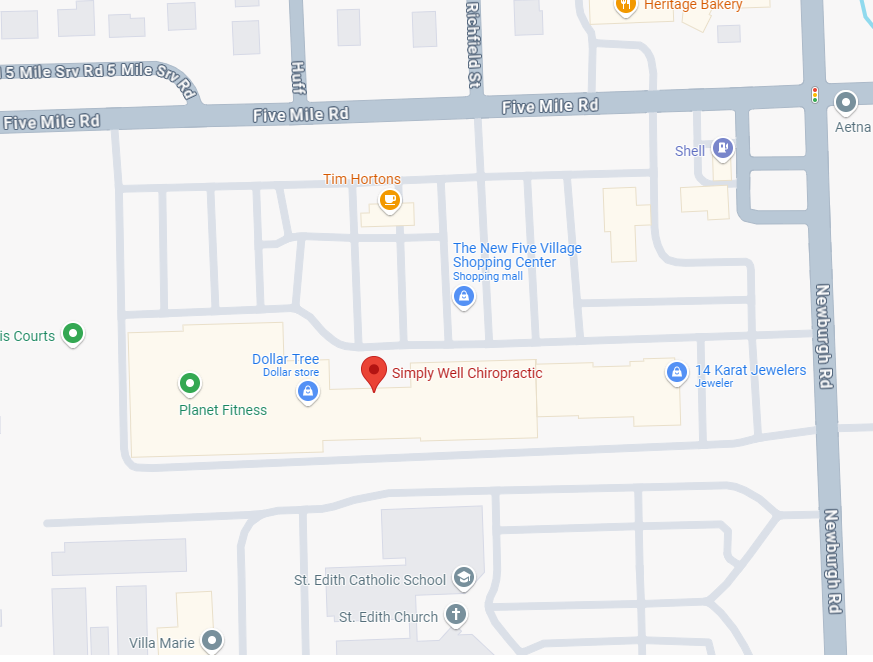Vertigo and Chiropractic Care: A Natural Approach to Relief
What is Vertigo?
Vertigo is a type of dizziness that creates the sensation of spinning or movement, even when you are still. Unlike general lightheadedness, vertigo is often associated with a feeling that either you or your surroundings are moving, tilting, or rotating. This sensation can be brief or persistent and may make it difficult to stand or walk without feeling off-balance.
Symptoms:
The symptoms of vertigo can vary in severity but typically include:
- Spinning sensation: A feeling that you or your environment is moving or rotating.
- Loss of balance: Difficulty maintaining a steady posture or walking without swaying or feeling unsteady.
- Nausea and vomiting: The sensation of spinning often leads to feelings of nausea and can sometimes result in vomiting.
- Ear-related symptoms: In some cases, vertigo can be accompanied by ringing in the ears (tinnitus), hearing loss, or a sense of fullness in the ear.
- Headache: Some individuals experience headaches, which may accompany or exacerbate vertigo episodes.
- Sweating: Excessive sweating can sometimes occur during a vertigo episode, often related to nausea or dizziness.
Common Causes:
There are several potential causes of vertigo, including issues with the inner ear, vestibular system (balance system), or the brain. Common causes include:
Benign Paroxysmal Positional Vertigo (BPPV):
-
- Cause: BPPV is one of the most common causes of vertigo, typically triggered by head movements. It occurs when small calcium crystals in the inner ear become dislodged and move into the semicircular canals, disrupting balance.
- Symptoms: Sudden dizziness or vertigo triggered by head movements like turning over in bed, looking up, or tilting the head back.
- Cause: BPPV is one of the most common causes of vertigo, typically triggered by head movements. It occurs when small calcium crystals in the inner ear become dislodged and move into the semicircular canals, disrupting balance.
Meniere’s Disease:
-
- Cause: This is a disorder of the inner ear caused by fluid buildup and increased pressure in the ear. It can lead to recurrent episodes of vertigo, tinnitus, and hearing loss.
- Symptoms: Episodes of vertigo lasting for minutes to hours, tinnitus, and fluctuating hearing loss.
- Cause: This is a disorder of the inner ear caused by fluid buildup and increased pressure in the ear. It can lead to recurrent episodes of vertigo, tinnitus, and hearing loss.
Vestibular Neuritis (or Labyrinthitis):
-
- Cause: This condition occurs when there is inflammation of the vestibular nerve (the nerve that helps control balance), usually caused by a viral infection.
- Symptoms: Sudden and severe vertigo, dizziness, nausea, and difficulty with balance, often accompanied by hearing loss if the inner ear is also affected.
- Cause: This condition occurs when there is inflammation of the vestibular nerve (the nerve that helps control balance), usually caused by a viral infection.
Cervicogenic Vertigo:
-
- Cause: Vertigo associated with problems in the cervical spine (neck), often due to neck injuries, misalignments, or tension. The neck and upper spine influence balance, and misalignments can interfere with the signals between the brain and the inner ear, leading to dizziness or vertigo.
- Symptoms: Vertigo triggered by neck movements, along with stiffness or pain in the neck and shoulders.
- Cause: Vertigo associated with problems in the cervical spine (neck), often due to neck injuries, misalignments, or tension. The neck and upper spine influence balance, and misalignments can interfere with the signals between the brain and the inner ear, leading to dizziness or vertigo.
Head or Neck Injuries:
-
- Cause: Any trauma to the head or neck can cause vertigo. Injuries to the vestibular system or cervical spine (e.g., whiplash) can disrupt balance and lead to dizziness.
- Symptoms: Vertigo or dizziness following an injury, especially with neck movements.
- Cause: Any trauma to the head or neck can cause vertigo. Injuries to the vestibular system or cervical spine (e.g., whiplash) can disrupt balance and lead to dizziness.
Migraines:
-
- Cause: People with migraines may experience vertigo as a symptom of their headache or in the form of vestibular migraines, which cause dizziness without a headache.
- Symptoms: Dizziness or vertigo associated with a migraine headache, light sensitivity, and nausea.
- Medications:
- Cause: Some medications, especially those that affect the inner ear or nervous system, can cause vertigo as a side effect.
- Symptoms: Dizziness or balance issues that occur after starting or changing medications.
- Cause: People with migraines may experience vertigo as a symptom of their headache or in the form of vestibular migraines, which cause dizziness without a headache.
Other causes:
-
- Stroke or Brain Injury: In rare cases, vertigo can be a symptom of a more serious condition such as a stroke or brain injury.
- Dehydration or Low Blood Pressure: These can sometimes contribute to feelings of dizziness or lightheadedness, which may be perceived as vertigo.
In this article, we will explore how chiropractic treatment can benefit vertigo sufferers, backed by scientific studies and evidence that support its effectiveness.
How Chiropractic Care Can Help with Vertigo:
Chiropractors focus on restoring proper spinal alignment, which can have a significant impact on the nervous system and inner ear function, potentially alleviating vertigo symptoms. Misalignments in the spine, particularly in the cervical (neck) region, can interfere with nerve function and disrupt the balance system in the inner ear, which can contribute to vertigo.
1. Cervical Spine (Neck) Adjustments:
The cervical spine, especially the first two vertebrae (C1 and C2), plays a crucial role in balance. Misalignments in this area can disrupt nerve signals to the brain and inner ear, leading to dizziness. Chiropractic adjustments can restore alignment, reduce nerve interference, and improve balance.
Focus Areas:
-
-
- C1, C2 vertebrae, upper cervical region.
-
2. Upper Thoracic Spine:
Misalignments in the upper back (thoracic spine) can cause tension that affects posture and balance. Chiropractic adjustments to this area help release tension, restore spinal function, and reduce vertigo symptoms.
Focus Areas:
-
-
- Upper thoracic vertebrae, T1-T4
-
3. Jaw and Temporomandibular Joint (TMJ):
TMJ dysfunction can contribute to vertigo by causing muscle tension and nerve interference that affects balance. Misalignments in the jaw may lead to dizziness, ear discomfort, and pain. Chiropractic care can realign the jaw, reduce muscle tension, and improve balance
Focus Areas:
-
-
- Upper thoracic vertebrae, T1-T4
-
Nutrition Tips for Vertigo Relief:
- Hydration: Dehydration can contribute to dizziness. Drink plenty of water throughout the day to stay hydrated and support overall bodily function.
- Anti-Inflammatory Foods: A diet rich in omega-3 fatty acids (found in fatty fish like salmon and walnuts) can reduce inflammation and promote healthy blood circulation, which is important for maintaining balance.
- Magnesium-Rich Foods: Magnesium is essential for nerve function and muscle relaxation. Foods like spinach, bananas, and almonds can help maintain proper balance and reduce the frequency of vertigo episodes.
- Limit Salt and Caffeine: Excessive sodium and caffeine can worsen dizziness by affecting blood pressure and fluid balance in the body. Reducing intake of these can help stabilize your condition.
Exercise Tips for Vertigo Relief:
- Vestibular Rehabilitation Exercises: These exercises are designed to improve the brain’s ability to process signals from the inner ear. Chiropractors may recommend specific exercises to help reduce dizziness and improve balance.
- Neck and Shoulder Stretches: Since neck misalignments are often a key factor in vertigo, gentle stretches targeting the neck and upper back can help relieve tension and improve mobility.
- Balance Exercises: Simple exercises such as standing on one leg or walking in a straight line can help improve stability and reduce the risk of falling or dizziness.
Scientific Studies Supporting Chiropractic Treatment for Vertigo
-
Supporting Studies: Chiropractic for Vertigo
Several studies support the effectiveness of chiropractic care in reducing the frequency, intensity, and duration of Vertigo, neck pain and headaches. Here are some key findings:
- A 2001 study published in the Journal of Manipulative and Physiological Therapeutics examined chiropractic adjustments for vertigo and dizziness. The study found that patients who received chiropractic care experienced significant improvement in vertigo symptoms, particularly those with neck-related causes of dizziness.
- A 2014 study published in Frontiers in Neurology found that chiropractic care for patients with cervicogenic dizziness (dizziness caused by neck problems) was effective in reducing symptoms and improving quality of life.
- A 2019 study published in the Journal of Chiropractic Medicine highlighted how spinal manipulations to the cervical spine significantly improved balance and reduced dizziness in patients with vertigo.
Why Choose Chiropractic Care for Vertigo?
Chiropractic care provides a holistic, non-invasive approach to managing vertigo. By addressing the root causes, such as spinal misalignments or neck dysfunctions, chiropractic adjustments can help restore balance, reduce dizziness, and improve overall well-being. Chiropractic care is a natural alternative to medications or other treatments that may only mask the symptoms without addressing the underlying issues.
If you’re struggling with vertigo and looking for a non-drug solution, chiropractic care may be a great option to consider. Chiropractic adjustments, combined with proper nutrition and exercise, can help alleviate your symptoms and improve your quality of life.
Ready to experience vertigo relief through chiropractic care? Contact us today to book your consultation and begin your journey to a pain-free life!




![Copy of [Original size] Beige Green Simple Welcome to Neighborhood Greeting Gift Card (6)](https://getsimplywell.com/wp-content/uploads/2024/04/Copy-of-Original-size-Beige-Green-Simple-Welcome-to-Neighborhood-Greeting-Gift-Card-6.png)